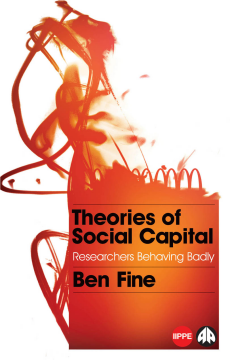
Additional Information
Book Details
Abstract
Tracing the evolution of social capital since his highly acclaimed contribution of 2001 (Social Capital Versus Social Theory), Ben Fine consolidates his position as the world's leading critic of the concept.
Fine forcibly demonstrates how social capital has expanded across the social sciences only by degrading the different disciplines and topics that it touches: a McDonaldisation of social theory. The rise and fall of social capital at the World Bank is critically explained as is social capital's growing presence in disciplines, such as management studies, and its relative absence in others, such as social history.
Writing with a sharp critical edge, Fine not only deconstructs the roller-coaster presence of social capital across the social sciences but also draws out lessons on how (and how not) to do research.
'A must-read for all irritated and irritable thinkers in social science'
Barbara Harriss-White, Oxford University
Table of Contents
| Section Title | Page | Action | Price |
|---|---|---|---|
| Cover | Cover | ||
| Contents | v | ||
| Acknowledgements | vii | ||
| Preface | viii | ||
| 1. Introduction | 1 | ||
| 2. From Rational Choice to McDonaldisation | 12 | ||
| 2.1 Introdution | 12 | ||
| 2.2 Pegging a Survey | 12 | ||
| 2.3 Social Capital as McDonaldisation | 17 | ||
| 2.4 The McDonaldisation Menu | 20 | ||
| 2.5 Concluding Remarks | 34 | ||
| 3. The Short History of Social Capital | 36 | ||
| 3.1 Introduction | 36 | ||
| 3.2 ’Twixt Becker and Bourdieu | 38 | ||
| 3.3 Departing Neo-Liberalism? | 46 | ||
| 3.4 Social Capital as Ploughman's Lunch | 49 | ||
| 3.5 Concluding Remarks | 58 | ||
| 4. The BBI Syndrome | 60 | ||
| 4.1 Introduction | 60 | ||
| 4.2 Social Capital as Black Hole | 62 | ||
| 4.3 BBI Gender on the Dark Side | 68 | ||
| 4.4 Social Capital in Context - Or Vice Versa | 75 | ||
| 4.5 BBBI by Way of Concluding Remarks | 84 | ||
| 5. Social Capital versus Social History | 90 | ||
| 5.1 Introduction | 90 | ||
| 5.2 The Historical Dog that Did Not Bark | 91 | ||
| 5.3 From Social Capital to History | 96 | ||
| 5.4 The Present as History | 104 | ||
| 5.5 There Is No Alternative | 106 | ||
| 6. Social Capital is Dead: Long Live Whatever Comes Next | 110 | ||
| 6.1 Introduction | 110 | ||
| 6.2 Social Capital's Irresistable Rise | 114 | ||
| 6.3 ... and Fall | 124 | ||
| 6.4 Strategic Weaknesses are Tactical Strengths | 129 | ||
| 6.5 Deconstructing the Buzz | 134 | ||
| 6.6 GBS, Hegel and Abraham Lincoln | 136 | ||
| 7. Management Studies Goes to McDonald’s | 140 | ||
| 7.1 Introduction | 140 | ||
| 7.2 ’Twixt Heterodoxy and Parasitism | 141 | ||
| 7.3 It Ain't Critical | 143 | ||
| 7.4 … And It Ain't Marxist | 153 | ||
| 7.5 Concluding Remarks | 156 | ||
| 8. Degradation without Limit | 158 | ||
| 8.1 Introduction | 158 | ||
| 8.2 Putnamenology | 158 | ||
| 8.3 The Dismal (Social) Science | 171 | ||
| 8.4 In Social Capital We Trust | 176 | ||
| 8.5 Concluding Remarks | 183 | ||
| 9. W(h)ither Social Capital? | 184 | ||
| 9.1 Introduction | 184 | ||
| 9.2 Flavouring But Not Favouring Social Capital | 185 | ||
| 9.3 Measure for Measure | 194 | ||
| 9.4 Social Capital as Policy? | 197 | ||
| 9.5 The Last Word - Again | 205 | ||
| Notes | 208 | ||
| Bibliography | 226 | ||
| Index | 260 |
